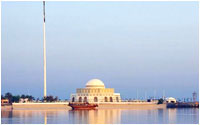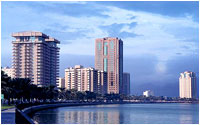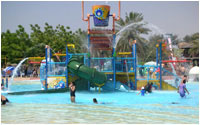

ABOUT UAE
 The United Arab Emirates is a federation of seven emirates, each with its own unique character and personality but united with a common goal and destiny. The seven emirates are Abu Dhabi, Dubai, Sharjah, Ajman, Umm Al Quwain, Ras Al Khaimah & Fujairah. Before the formation of the Federation in 1971, these seven emirates were known as the ‘Trucial States'.
The United Arab Emirates is a federation of seven emirates, each with its own unique character and personality but united with a common goal and destiny. The seven emirates are Abu Dhabi, Dubai, Sharjah, Ajman, Umm Al Quwain, Ras Al Khaimah & Fujairah. Before the formation of the Federation in 1971, these seven emirates were known as the ‘Trucial States'.
 The United Arab Emirates is a federation of seven emirates, each with its own unique character and personality but united with a common goal and destiny. The seven emirates are Abu Dhabi, Dubai, Sharjah, Ajman, Umm Al Quwain, Ras Al Khaimah & Fujairah. Before the formation of the Federation in 1971, these seven emirates were known as the ‘Trucial States'.
The United Arab Emirates is a federation of seven emirates, each with its own unique character and personality but united with a common goal and destiny. The seven emirates are Abu Dhabi, Dubai, Sharjah, Ajman, Umm Al Quwain, Ras Al Khaimah & Fujairah. Before the formation of the Federation in 1971, these seven emirates were known as the ‘Trucial States'.
Abu Dhabi
Abu Dhabi is the capital and is the center of government and business in UAE. Due to the presence of innumerable skyscrapers, the city is known as the ‘Manhattan' of the Middle East. Abu Dhabi's oil wealth is wisely utilized to build a healthy trade and commerce atmosphere along with a neatly laid out city. Large gardens and parks and the green trees lining the streets and roads have turned this city from a desert land to a green oasis. This is the largest of all seven emirates occupying an area of 26,000 square miles.

Abu Dhabi is the capital and is the center of government and business in UAE. Due to the presence of innumerable skyscrapers, the city is known as the ‘Manhattan' of the Middle East. Abu Dhabi's oil wealth is wisely utilized to build a healthy trade and commerce atmosphere along with a neatly laid out city. Large gardens and parks and the green trees lining the streets and roads have turned this city from a desert land to a green oasis. This is the largest of all seven emirates occupying an area of 26,000 square miles.
Dhabi
Dubai is the second largest emirate in UAE occupying nearly 1000 square miles and is known as the commercial and tourist hub of the Gulf. The city is divided into two by the famous Dubai Creek. The natural harbor and the strategic location in the international trade have made Dubai one of the world's leading commercial and trading Center. The Al Maktoum family are the Rulers of Dubai from 1883. H.H Sheikh Rashid Bin Saeed Al Maktoum is well known as a visionary and one of the founding members of UAE along with President H.H Sheikh Zayed Bin Sultan Al Nahyan. Dubai's growth can be traced back to the beginning of 20th century when the grand father of H.H Sheikh Rashid Bin Saeed Al Maktoum persuaded the British Shipping Line plying between Britain and India to make Dubai as its main port in 1940's. H.H Sheikh Rashid Bin Saeed Al Maktoum carried forward the mantle with the establishment of a police force, customs service, etc. After the discovery of oil in 60's Dubai prominence has grown but aware of the risks in dependency on oil, Sheikh Rashid actively promoted new industrial ventures. The Jebal Ali Free Zone, Dubai Aluminum Company, etc. are examples of that. The present Ruler is H.H. Sheikh Mohammed Bin Rashid Al Maktoum.

Dubai is the second largest emirate in UAE occupying nearly 1000 square miles and is known as the commercial and tourist hub of the Gulf. The city is divided into two by the famous Dubai Creek. The natural harbor and the strategic location in the international trade have made Dubai one of the world's leading commercial and trading Center. The Al Maktoum family are the Rulers of Dubai from 1883. H.H Sheikh Rashid Bin Saeed Al Maktoum is well known as a visionary and one of the founding members of UAE along with President H.H Sheikh Zayed Bin Sultan Al Nahyan. Dubai's growth can be traced back to the beginning of 20th century when the grand father of H.H Sheikh Rashid Bin Saeed Al Maktoum persuaded the British Shipping Line plying between Britain and India to make Dubai as its main port in 1940's. H.H Sheikh Rashid Bin Saeed Al Maktoum carried forward the mantle with the establishment of a police force, customs service, etc. After the discovery of oil in 60's Dubai prominence has grown but aware of the risks in dependency on oil, Sheikh Rashid actively promoted new industrial ventures. The Jebal Ali Free Zone, Dubai Aluminum Company, etc. are examples of that. The present Ruler is H.H. Sheikh Mohammed Bin Rashid Al Maktoum.
Sharjah 
Sharjah is named as the ‘Cultural Capital of UAE' by UNESCO and is next to Dubai. It is well connected with other emirates by good highways and its coastline runs approximately around 30 Kms. Along the Arabian Gulf. under the able guidance of the present Ruler H.H Sheikh Sultan Bin Mohammed Al Qassimi, Sharjah has made rapid progress. The emirate is famous for its number of museums spread all around which exhibits the richness of Arabian culture and traditions. The discovery of oil in 1971 at the Mubarak Oil field has changed the fortunes of the emirates These fortunes were further boosted with the discovery of onshore gas and liquid gas in 1981. Sharjah was also the first port in the entire Middle East to possess fully equipped container facilities. The famous port of Khorfakkan provides important facilities for ships that do not need to enter the Gulf. Places like Khorfakkan, Dibba, Masafi, etc. are popular tourist places.

Sharjah is named as the ‘Cultural Capital of UAE' by UNESCO and is next to Dubai. It is well connected with other emirates by good highways and its coastline runs approximately around 30 Kms. Along the Arabian Gulf. under the able guidance of the present Ruler H.H Sheikh Sultan Bin Mohammed Al Qassimi, Sharjah has made rapid progress. The emirate is famous for its number of museums spread all around which exhibits the richness of Arabian culture and traditions. The discovery of oil in 1971 at the Mubarak Oil field has changed the fortunes of the emirates These fortunes were further boosted with the discovery of onshore gas and liquid gas in 1981. Sharjah was also the first port in the entire Middle East to possess fully equipped container facilities. The famous port of Khorfakkan provides important facilities for ships that do not need to enter the Gulf. Places like Khorfakkan, Dibba, Masafi, etc. are popular tourist places.
Umm Al Quwain 
The traditional occupation of this Emirate was fishing and date cultivation and it is located between the emirate of Ajman and Ras Al Khaimah on the west coast. The main attraction of the emirate is its clean beaches, enclosed lagoon and public horse riding stables. 50 Kilometers south of Umm Al Quwain city is the agricultural part of Falaj Al Mualla. The Seneyah Island which is about 1 Km. Away from the city is a natural reserve for large number of birds, deer and Al Qaram trees. World's largest ‘Aqua Park' is situated in this emirate.

The traditional occupation of this Emirate was fishing and date cultivation and it is located between the emirate of Ajman and Ras Al Khaimah on the west coast. The main attraction of the emirate is its clean beaches, enclosed lagoon and public horse riding stables. 50 Kilometers south of Umm Al Quwain city is the agricultural part of Falaj Al Mualla. The Seneyah Island which is about 1 Km. Away from the city is a natural reserve for large number of birds, deer and Al Qaram trees. World's largest ‘Aqua Park' is situated in this emirate.
Ras Al Khaimah 
H.H Sheikh Saqr Bin Mohammed Al Qassimi from 1948 rules this northern most emirate of UAE. Ras Al Khaimah's history extends into antiquity. Archeological excavations revealed that the emirate was the settlement of an advanced civilization, which have done extensive trade with Indian sub-continent. Historical records site that the town of Ras Al Khaimah , then known as Julfar, belonged to early Muslim Caliphs. In the 18th century, after the invasion of Persians, Portuguese and Dutch, it became a part of Al Qawasim state. Once Ras Al Khaimah was also the center of the naval strength of the southern Gulf States. Though the traditional occupations of this emirate were fishing, trading and agriculture, it is very modernized to meet the demands of the modern UAE economy.

H.H Sheikh Saqr Bin Mohammed Al Qassimi from 1948 rules this northern most emirate of UAE. Ras Al Khaimah's history extends into antiquity. Archeological excavations revealed that the emirate was the settlement of an advanced civilization, which have done extensive trade with Indian sub-continent. Historical records site that the town of Ras Al Khaimah , then known as Julfar, belonged to early Muslim Caliphs. In the 18th century, after the invasion of Persians, Portuguese and Dutch, it became a part of Al Qawasim state. Once Ras Al Khaimah was also the center of the naval strength of the southern Gulf States. Though the traditional occupations of this emirate were fishing, trading and agriculture, it is very modernized to meet the demands of the modern UAE economy.
Fujairah 
Fujairah holds a unique position in the UAE, as being the only emirate on the eastern side while all other six emirates are along the Arabian Gulf. The Hajar Mountains that divides UAE into two has kept Fujairah separated from the rest of the country. Main occupation in the past of this emirate was fishing and agriculture. The Fujairah port is an important port for all major container lines and for the world's largest livestock shipping companies, which has set up their main holding station for sheep and cattle for the entire Arabian Peninsula. It is also famous for its clean beaches and is a paradise for swimming, yachting, diving, snorkeling and deep-sea fishing. The emirate is very popular among the tourists and so many new hotels are being built on the coastal strip between Dibba and Al Faqueet.. Installation of a cable car system is also undergoing in full stream in Al Wareeah. The Ministry of Agriculture and Fisheries are planning for a dam near the famous waterfall.

Fujairah holds a unique position in the UAE, as being the only emirate on the eastern side while all other six emirates are along the Arabian Gulf. The Hajar Mountains that divides UAE into two has kept Fujairah separated from the rest of the country. Main occupation in the past of this emirate was fishing and agriculture. The Fujairah port is an important port for all major container lines and for the world's largest livestock shipping companies, which has set up their main holding station for sheep and cattle for the entire Arabian Peninsula. It is also famous for its clean beaches and is a paradise for swimming, yachting, diving, snorkeling and deep-sea fishing. The emirate is very popular among the tourists and so many new hotels are being built on the coastal strip between Dibba and Al Faqueet.. Installation of a cable car system is also undergoing in full stream in Al Wareeah. The Ministry of Agriculture and Fisheries are planning for a dam near the famous waterfall.




